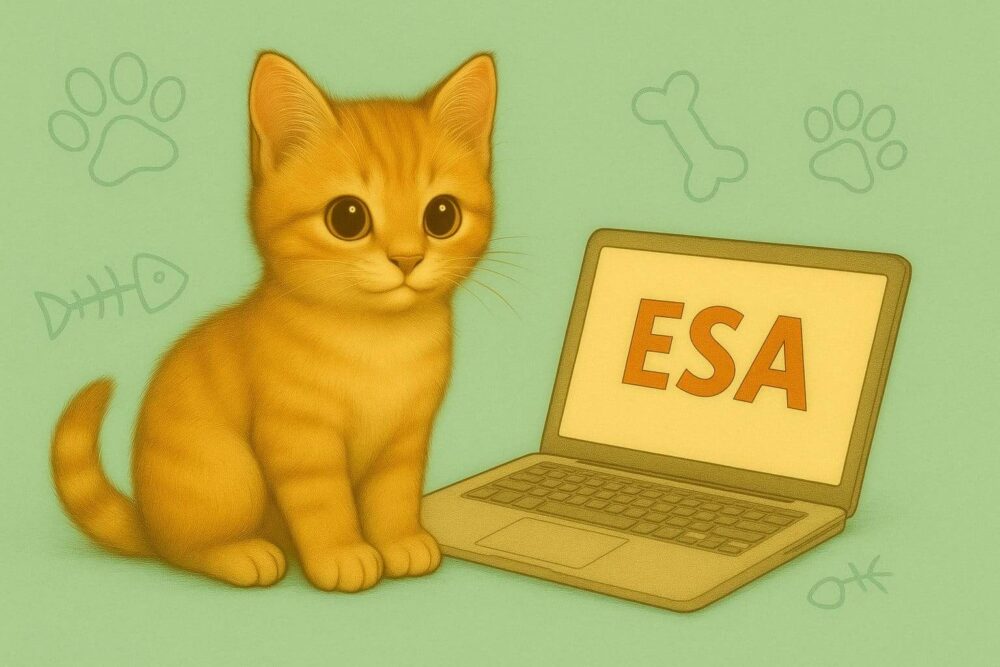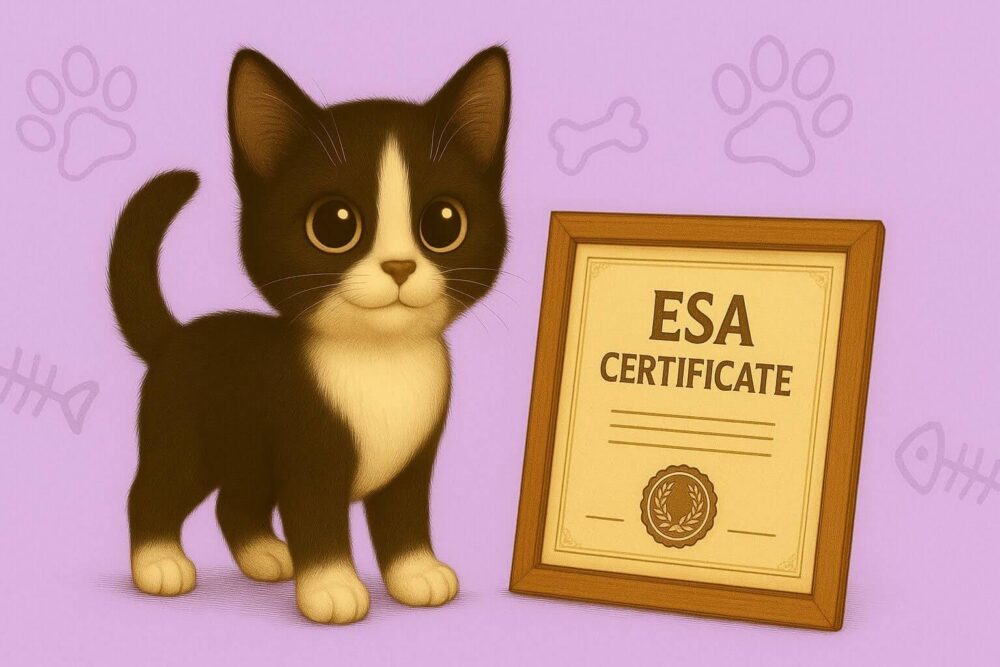
Table of Contents
Does your cat act as your unpaid therapist, providing loads of daily emotional support without (or almost without) complaints? If you’re someone who deeply relies on getting that regular dose of your animal friend’s purr, then you may question: “Can you have an emotional support cat?”
That’s where things get interesting. Online websites are filled with misinformation, and doing extensive research can add extra pressure, especially if you’re in the middle of finding a place to rent. Without proper documentation, a landlord can prevent your furry friend from living with you.
If you want to keep a cat as an emotional support animal (ESA), we’ll help you understand the scientific benefits of living with one and all the paperwork you need to complete to get housing benefits.

Can You Have an Emotional Support Cat?
Since support animals help you regulate your mental health, they get extra legal benefits compared to regular pets under the Fair Housing Act (FHA). Cats are no exception since the Department of Housing and Urban Development (HUD) states that any “domesticated pet” is eligible to be an ESA. Besides dogs, birds, fish, and rabbits, cats are another common choice for an ESA.
Keep in mind that there are a few exceptions to the FHA rule that allow landlords to reject your ESA or possibly even evict you. For example, landlords don’t have to entertain a feline who constantly scratches the walls until they’re unrecognizable or litters in the neighbour’s area.
Are ESA and Therapy Cats the Same?
The short answer is no. Therapy and ESA cats are not the same, and those terms can’t be used interchangeably. If you like geeking over cat specifics, check out the table below to understand the main differences between ESA and therapy cats:
| ESA Cats | Therapy Cats |
| Prescribed to individuals suffering from mental health struggles | Often provide support to a variety of people in institutions like schools or hospitals |
| Protected under the FHA | Not protected under any laws |
| Live with their owners | Interact with people temporarily during therapy programs |
While both ESA and therapy cats help people relax and remain calm, think of the former as your personal emotional buddy, while the latter’s more of an energetic hospital nurse.
ESA cats should also not be confused with service animals, which are mainly dogs. ESAs don’t get the same public or travel rights as them, nor need extensive training to assist with any disability.
Unlike service animals, ESAs no longer have flying privileges, meaning their ESA status doesn’t automatically give them access to planes and airports. There may be airlines that allow your cat to travel with you, but only as long as Mr. Fluffy McPaw behaves properly.
Science Behind the Purr: Benefits of an Emotional Support Cat
Do you like listening to the soothing purrs of a cat? You’re definitely not alone! In fact, there are real scientific reasons why their gentle sounds bring us peace and comfort. Let’s break it down!
Physical Effects
Did you know that a cat’s purr has a specific frequency? It is typically between 25 and 150 Hz, which matches the range used in vibrational therapy. Studies suggest that these low-frequency sounds can promote healing in bones and soft tissues.
Additionally, purring has a calming effect on the autonomic nervous system (ANS), which controls involuntary bodily functions like heart rate, blood pressure, and breathing. So, when your cat curls up and purrs in your lap, it might be helping your body heal.
Mental Effects
When you pet your cat and hear that soothing purr, your brain releases oxytocin, aka the “love hormone.” This helps you feel calm and boosts your happiness.
Spending time with your furry friend also lowers cortisol (stress hormone), lifting your mood and easing anxiety. The steady rhythm of a cat’s purr creates a peaceful vibe, making it easier to relax and let go of stress.

How To Choose the Right Cat Breed for Emotional Support
When choosing the right feline companion for emotional support, the breed can make a big difference. While you can snuggle with any fur ball, certain breeds are known for their affectionate and soothing nature. Here are some of the most famous options.
Maine Coon
Maine coons are known for their friendly and mild-mannered temperament. While they may not always demand cuddles, they are incredibly affectionate and social with their owners. Their gentle nature makes them a great choice for those looking for a loving, low-maintenance companion.
Ragdoll
If you’re in need of a cuddle buddy, a ragdoll might just be your perfect match. These cats are famously gentle, affectionate, and playful. They’re known to relax into your arms like a ragdoll (hence the name!), making them ideal for stress relief and comfort.
British Shorthair
British shorthairs are patient, easygoing, and prefer gentle petting over long snuggles. If you want a laid-back companion who doesn’t require too much attention, this breed would suit you. They offer calm companionship without being too demanding.
Sphynx
Looking for a snuggle buddy that loves attention? The sphynx is your cat! Their hairless coats make them a safer choice since they produce fewer allergens than other breeds, while their need for affection ensures you’ll always have a close, loving bond.
What Rights Do ESA Cat Owners Get?
Knowing that you can rent any place with your cat without breed restrictions sounds great on paper. But let’s learn more about the actual housing rights you get as an ESA cat owner:
- Housing protection—No property manager (even those grubby ones with “no cats in my area” policies) can unjustly reject your BFF from living with you, nor are they allowed to inquire about your specific mental health condition.
- No pet fees—As long as you have appropriate documentation, landlords cannot charge you any pet fees, pet rent, or deposits throughout your lease tenure.
- Discrimination prevention—Even if you disclose your BFF mid-lease, landlords are not allowed to reject your application or cancel your lease. The HUD specifically allows ESA owners to report such cases and protect their rights.
Keep in mind that all these rights only kick in once you have an ESA letter written by a licensed mental health professional (LMHP). This is the sole document that lets you enjoy federally protected, cozy hugs with your cat in rentals.
Purrmission Granted? Who Can Qualify To Adopt an Emotional Support Cat?
Getting your cat the ESA status is a must if you want it to live with you in a no-pets property, but not everyone can qualify for an ESA. Unfortunately, emotional support cat status isn’t approved for occasional sadness or stress, as those are natural parts of life. Only people with verified and documented mental struggles mentioned in the Diagnostic and Statistical Manual of Mental Disorders (DSM-5-TR) are eligible to get one.
These conditions can include, but are not limited to:
- Depression
- Attention deficit hyperactivity disorder (ADHD)
- Personality disorders
- Obsessive-compulsive disorder (OCD)
- Anxiety
- Post-traumatic stress disorder (PTSD)
You can’t self-diagnose to qualify for ESA. Only licensed mental health professionals (LMHPs) can evaluate you for such conditions.
After consultation with an LMHP, they will give you an ESA letter if they are certain that an emotional support cat will benefit your mental health. This document lets you rent a place and live with your animal friend comfortably, even if the place is a no-pets property.

A Mini-Guide to Making Your Cat an ESA
Ready to put some legal respect on your BFF’s name? Follow the mini guide below to learn how you can get an ESA letter and officially turn your cat into a support animal:
- Find an LMHP
- Get examined
- Obtain your letter
1. Find an LMHP
Only LMHPs who are licensed and practice in your respective state are allowed to write an ESA prescription for you. Some states, like California, may require you to establish a month-long relationship with your LMHP before they can write a letter for you.
In situations like these, it’s best to consult a professional who likely knows you and your medical history, such as a therapist. If they’re unavailable to help you at the moment, you can always visit other LMHPs, like:
- Psychiatrists
- Psychiatric mental health nurses (PMHNs)
- Licensed clinical social workers (LCSWs)
- Counselors
- Nurse practitioners
- Psychologists
- Pediatric neurologists
2. Get Examined
Once you find a suitable LMHP, schedule a consultation session with them. During this time, they’ll look for symptoms that may suggest you have a mental health condition mentioned in DSM-5-TR.
3. Obtain Your Letter
If an LMHP confirms you genuinely experience mental struggles, they’ll prescribe an ESA. The ESA letter can recommend that you adopt a cat or confirm that your current cat qualifies as an ESA, even if it wakes you up at three in the morning to mess with you.
This letter should mention how your purring little therapist helps alleviate your symptoms and support your well-being.
In case you don’t know any LMHPs nearby, you can always take the virtual route of getting an ESA letter. But hold your horses. Before you Google “ESA letter free, cheap, and instant,” keep in mind that the internet is filled with fake ESA letters, DIY templates, and scammy sites that purr-tend to be legit.
Scams To Watch Out For When Getting an Online ESA Letter
Getting an ESA letter from the comfort of your home is a convenient option, but buyer beware—there are plenty of sketchy websites out there that could lead you down the wrong path. To help you avoid pitfalls, here are some key red flags to look out for:
- Too-good-to-be-true ESA letters: A legitimate ESA letter comes at a cost because it’s issued by a licensed medical professional. If a site promises an ESA letter for little to no cost, it’s likely not genuine.
- The “ESA certificate”: There’s no such thing as an official ESA certificate. Some sites may offer one with flashy stamps and seals, but it holds no real value and won’t help you with housing or travel.
- ESA registration: The federal government doesn’t host a registry where owners have to “register” their ESA. If a site asks you to pay a fee to register your animal, it’s a scam.
- Instant ESA letters: Only a licensed mental health professional can issue an ESA letter after a thorough evaluation and diagnosis. This typically takes around 24–48 hours. If a site promises you an ESA letter instantly, it’s a no-go.
Get a Legit and Purr-Fessional ESA Letter With Your Service Animal
Your Service Animal is an online ESA letter provider that understands your need to be with your cat better than anyone else. It prioritizes speed, convenience, and 100% compliance with housing laws to ensure your letter is genuine and checks all boxes.
Here’s what sets YSA apart from other ESA platforms:
| Feature | Benefits |
| Free online qualification quiz | A no-cost qualification quiz that lets you understand whether you’re eligible to get an ESA |
| Online-based services | Instead of waiting in lines, you can quickly complete the application and consultation from the comfort of your home, as long as your cat doesn’t chew your computer wires first |
| Quick service | Once approved, you get your ESA letter within 24–48 hours from the consultation session |
| 100% money-back guarantee | In case your letter isn’t approved by an LMHP or accepted by a landlord, we guarantee a full refund, no questions asked |
How the Process Works
Ready to live with your lovable animal friend without worrying about breed restrictions? Just complete these steps:
- Find out if you’re a good fit for an ESA letter with our online quiz
- Schedule an online appointment with a licensed mental health practitioner in your state
- Attend the online call and receive your ESA letter if clinically appropriate
- Receive a full refund if the therapist doesn’t issue an ESA letter or your landlord rejects your letter








